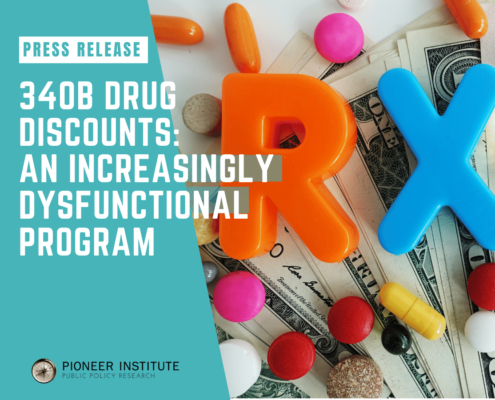
MBTAAnalysis: A look inside the MBTA
0 Comments
/
The MBTA shuttles over a million passengers a day around Greater…
 https://pioneerinstitute.org/wp-content/uploads/CloseupClock-1.jpg
739
1244
Mary Connaughton
https://pioneerinstitute.org/wp-content/uploads/logo_440x96.png
Mary Connaughton2017-02-20 12:34:192017-02-21 09:47:58The Clock is Ticking…….
https://pioneerinstitute.org/wp-content/uploads/CloseupClock-1.jpg
739
1244
Mary Connaughton
https://pioneerinstitute.org/wp-content/uploads/logo_440x96.png
Mary Connaughton2017-02-20 12:34:192017-02-21 09:47:58The Clock is Ticking…….
Comments on How Pharmacy Benefit Managers (PBMs) affect Smaller Pharmacies and Consumers (ID FTC-2022-0015-0001)
Pioneer Institute Senior Fellows William Smith and Robert Popovian submitted public comments about PBM business practices to the Federal Trade Commission (FTC). Pioneer recommended that PBM discounts be passed along to patients when they are meeting their deductible or coinsurance requirements.

340B Drug Discounts: An Increasingly Dysfunctional Program
This report reviews the federal 340B drug discount program, showing that, over the past decade, the revenue for hospitals generated by the program, initially intended to serve low-income, uninsured populations, has exploded even while a number of important Massachusetts hospitals have reduced the level of charity care they provide. The study notes that nationwide, 340B drug sales rose from $9 billion in 2014 to $38 billion in 2020.

Testimony in opposition to S. 2651 to impose price controls
Testimony submitted on February 4, 2022 in opposition to S. 2651, legislation that would impose price controls on one of Massachusetts most important economic sectors, biopharmaceuticals.

An “Impending Tsunami” in Mortality from Traditional Diseases?
This report examines whether, after the COVID-19 pandemic subsides, the U.S. will have another looming public health crisis emerging from patients failing to have had their cardiology needs addressed properly during the lockdowns. Moreover, if we surmise that a follow-on public health crisis will emerge, we can also conclude that certain population segments are going to be more impacted by CVD, as there are documented health disparities in this therapeutic area. Finally, there are policy changes that could be taken to mitigate a possible spike in CVD adverse events; the paper will close by recommending certain policy changes.

Testimony in Support of Expanded Access to Oral Health
There is a bill before the Massachusetts Legislature seeking to expand access to dental care through the creation of a mid-level provider position, commonly known as a dental therapist.

Dialing up Telemedicine
Massachusetts should more aggressively embrace telemedicine, which can reduce healthcare costs, increase patient satisfaction, and is more convenient for both patients and physicians.

Out of the Filing Cabinet and Into the Fire: How the Shift from Paper to Electronic Health Records Has Endangered Patient Privacy and Security and How to Calm the Flame
This paper will discuss the importance of secure medical records in health information exchanges (HIEs), the general history of EHRs in the US and in Massachusetts particularly, the history of privacy rights in the medical field, and finally efforts being taken to ensure more protected and private EHRs.

Mayor, Tear Down This Wall: Why Boston’s Ban on Convenient Care Clinics Is Costing Taxpayers Millions
As convenient care clinics (also known as walk-in clinics or limited service clinics) grow in popularity across the nation, Boston remains empty of these clinics due to mayoral opposition. Convenient care clinics, a relatively new development in the world of health care, first emerged just 12 years ago.

First Do No Harm: The Impact of the Affordable Care Act on Massachusetts’ Medical Device Industry
This brief is one of many in a series from Pioneer Institute examining the direct effects of the PPACA on Massachusetts. The purpose of this report is to estimate the annual impact of the law’s tax on the 19 biggest medical device companies conducting business in Massachusetts.

Business Solutions to the Health Care Crunch
While larger employers have engaged their employees in wellness initiatives and consumer-driven approaches, small employers have often lagged behind. Small businesses can, however, adopt these health benefit approaches to address their own rising health care costs.

Nonprofit to For Profit Conversions in Health Care: A Review
The analysis presented in the paper suggests areas in which caution must be exercised to assure that community benefits provided by nonprofits are preserved in a post-conversion environment, and that full value is realized and appropriately redirected. Nothing in the analysis indicates that nonprofit to for-profit conversion should be barred from consideration in Massachusetts.
